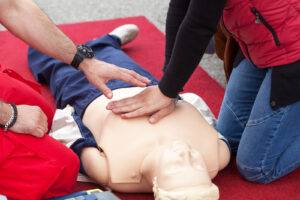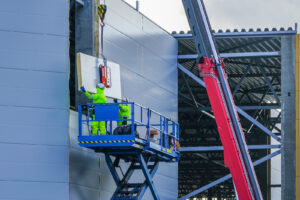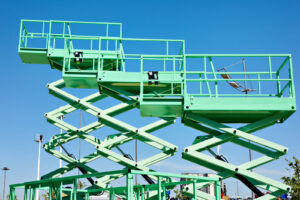 Sometimes, despite the best intentions, good preparation and adherence to all health and safety rules, accidents occur in which someone is injured. In such circumstances, it is necessary to proceed to first aid. These are steps to preserve life and health before specialist emergency, medical assistance. Knowledge of first aid - what you should do in accident situations - should be renewed and updated regularly. To be able to help the injured and those in need as best as possible. But in any case, as long as someone has helped (however they can), they have fulfilled their civil duty to provide first aid (under the National Emergency Medical Services Act). In order to be able to fulfil this duty to the best of their ability, children already go through first aid training at school - basics that should always be kept in mind. When qualifying for a driving licence, a first aid course is compulsory, and in every car, as a compulsory part of the equipment, there must be a first aid kit. In every home, people have personal first aid kits which, in addition to medication, contain dressing materials. Also on trips, one should carry at least plasters.
Sometimes, despite the best intentions, good preparation and adherence to all health and safety rules, accidents occur in which someone is injured. In such circumstances, it is necessary to proceed to first aid. These are steps to preserve life and health before specialist emergency, medical assistance. Knowledge of first aid - what you should do in accident situations - should be renewed and updated regularly. To be able to help the injured and those in need as best as possible. But in any case, as long as someone has helped (however they can), they have fulfilled their civil duty to provide first aid (under the National Emergency Medical Services Act). In order to be able to fulfil this duty to the best of their ability, children already go through first aid training at school - basics that should always be kept in mind. When qualifying for a driving licence, a first aid course is compulsory, and in every car, as a compulsory part of the equipment, there must be a first aid kit. In every home, people have personal first aid kits which, in addition to medication, contain dressing materials. Also on trips, one should carry at least plasters.
Statistically, cuts (even against paper) are the most common. If the wound is not large and the bleeding stops, it is sufficient to disinfect it and apply an adhesive plaster. In such cases, it is very rare for specialist medical help to be called in addition, as the wound begins to heal quickly. However, dressing hygiene (changing the dressing regularly) must always be kept in mind in order to prevent infection - which can result in serious illness. The risk of infection increases the larger the wound. Significant haemorrhage can also make a person weak, so it is important to monitor their condition and give them something to drink, eat and a while to recover.
In addition, nosebleeds can often occur. Particularly during the pollen season, people with allergies may simply have sensitised sinuses and, as a result of frequent nose blowing, blood may fly. It is necessary to stop the bleeding and preferably go to the bathroom so that running (cold) water is available. The person should lean forward (so that the blood does not flow down into the oesophagus, but comes straight out of the nose). If the nose is not broken, the nasal pads should be squeezed lightly to stop the bleeding. If the nose is broken, it should not be touched, only waited for the bleeding to stop. Cold water can also be used to cool the forehead and neck, which may help the bleeding to stop more quickly. If the bleeding does not stop after a long time and the person becomes visibly weakened, call the emergency services. If the bleeding stops within 5 minutes, it is a good idea to eat something, have a drink and rest for a while. Later, you should go to a doctor to assess the person's health situation.

It can also happen that someone faints due to general weakness of the body and being in demanding conditions (for example, working in high temperatures). The best thing to do is to pay attention to someone's sudden severe weakness so that they do not fall in an unfortunate way (itself likely to cause further serious injury). You should move to a place with more comfortable conditions, sit down or even lie down with your legs up. And consult a doctor about the incident.
In such cases, attention needs to be paid to good personal health, as any safeguards at work will not be effective in preventing such accidents. On the other hand, other employees may be prepared to provide first aid efficiently, which will keep the injured from further damage to their health.
Whenever first aid is given, attention must first be paid to the safety of those around you. If this is not guaranteed, the person providing the assistance, himself or herself, may also be injured, resulting in more people being injured without any further guarantee of saving life and health, because the person who was able to provide it is now also injured and needs help. If the conditions to provide help are not safe, you should immediately call the emergency services and wait for them to arrive (while still monitoring the situation), as this is the most you can do at that point. If we are able to provide first aid, calling for help is key at all times. By contacting the services, they can provide advice directly on how to proceed.







